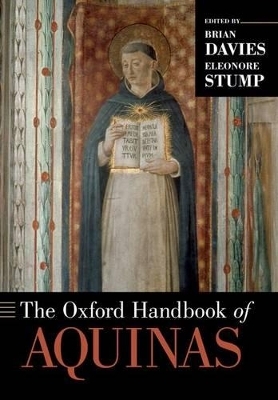
The Oxford Handbook of Aquinas
Oxford University Press Inc (Verlag)
978-0-19-935198-5 (ISBN)
Thomas Aquinas (1224/6-1274) lived an active, demanding academic and ecclesiastical life that ended while he was still comparatively young. He nonetheless produced many works, varying in length from a few pages to a few volumes.
The present book is an introduction to this influential author and a guide to his thought on almost all the major topics on which he wrote. The book begins with an account of Aquinas's life and works. The next section contains a series of essays that set Aquinas in his intellectual context. They focus on the philosophical sources that are likely to have influenced his thinking, the most prominent of which were certain Greek philosophers (chiefly Aristotle), Latin Christian writers (such as Augustine), and Jewish and Islamic authors (such as Maimonides and Avicenna). The subsequent sections of the book address topics that Aquinas himself discussed. These include metaphysics, the existence and nature of God, ethics and action theory, epistemology, philosophy of mind and human nature, the nature of language, and an array of theological topics, including Trinity, Incarnation, sacraments, resurrection, and the problem of evil, among others. These sections include more than thirty contributions on topics central to Aquinas's own worldview. The final sections of the volume address the development of Aquinas's thought and its historical influence.
Any attempt to present the views of a philosopher in an earlier historical period that is meant to foster reflection on that thinker's views needs to be both historically faithful and also philosophically engaged. The present book combines both exposition and evaluation insofar as its contributors have space to engage in both. This Handbook is therefore meant to be useful to someone wanting to learn about Aquinas's philosophy and theology while also looking for help in philosophical interaction with it.
Brian Davies is Professor of Philosophy at Fordham University. Eleonore Stump is Robert J. Henle Professor of Philosophy at Saint Louis University.
Abbreviations ; List of Contributors ; Introduction, Brian Davies and Eleonore Stump ; Part I - Historical Background ; 1. Life and Works, Jean-Pierre Torrell, O.P. ; 2. Aquinas and Aristotle, James Doig ; 3. Augustine to Aquinas (Latin-Christian Authors), Alexander Fidora ; 4. Aquinas, Plato, and Neo-Platonism, Wayne J. Hankey ; 5. Aquinas and Jewish and Islamic Authors, David B. Burrell, C.S.C. ; Part II - Metaphysics and the Existence of God ; 6. Being, John F. Wippel ; 7. Matter, Form, and Individuation, Jeffrey E. Brower ; 8. Causation, Michael Rota ; 9. The Five Ways, Timothy Pawl ; Part III - The Divine Nature ; 10. God's Simplicity, Eleonore Stump ; 11. God's Goodness, Ludger Honnefelder ; 12. God's Knowledge and Will, James Brent, O.P. ; 13. God's Impassibility, Immutability, and Eternality, Brian Leftow ; 14. God's Omnipotence, Brian Leftow ; Part IV - Ethics and Action Theory ; 15. Human Freedom and Agency, Thomas Williams ; 16. Emotions, Peter King ; 17. Happiness, Brian Davies ; 18. Law and Natural Law, Michael Baur ; 19. Conscience and Synderesis, Tobias Hoffman ; 20. Virtues and Vices, Jean Porter ; 21. Practical Reasoning, Thomas M. Osborne, Jr. ; 22. The Theological Virtues, Joseph Wawrykow ; Part V - Epistemology and Philosophy of Mind ; 23. Human Knowledge, Martin Pickave ; 24. Intellectual Virtues, Tobias Hoffman ; 25. The Relation of Reason to Faith, Bruno Niederbacher, S.J. ; 26. Philosophy of Mind and Human Nature, Robert Pasnau ; Part VI - Theory of Language ; 27. Theory of Language, Gyula Klima ; 28. The Limits of Language and the Notion of Analogy, Brian Davies ; Part VII - Philosophical Theology ; 29. Providence and the Problem of Evil, Eleonore Stump ; 30. The Trinity, Gilles Emery ; 31. Incarnation, Michael Gorman ; 32. The Saving Work of Christ, Rik Van Nieuwenhove ; 33. Sacraments, Dominic Holtz, O.P. ; 34. Resurrection and the Separated Soul, Eleonore Stump ; 35. Prayer, Brian Davies ; 36. The Gifts and Fruits of the Holy Spirit, Andrew Pinsent ; Part VIII - Aquinas's Intellectual Progress and the Influence of his Thinking ; 37. The Development of Aquinas's Thought, Giorgio Pini ; 38. The Influence of Aquinas, Christopher Upham ; Chronological List of Aquinas's Writings ; Editions and Translations ; Bibliography ; Index
| Erscheint lt. Verlag | 10.4.2014 |
|---|---|
| Reihe/Serie | Oxford Handbooks |
| Verlagsort | New York |
| Sprache | englisch |
| Maße | 170 x 241 mm |
| Gewicht | 1021 g |
| Themenwelt | Geschichte ► Teilgebiete der Geschichte ► Religionsgeschichte |
| Geisteswissenschaften ► Philosophie ► Philosophie des Mittelalters | |
| Geisteswissenschaften ► Religion / Theologie ► Christentum | |
| ISBN-10 | 0-19-935198-8 / 0199351988 |
| ISBN-13 | 978-0-19-935198-5 / 9780199351985 |
| Zustand | Neuware |
| Haben Sie eine Frage zum Produkt? |
aus dem Bereich


